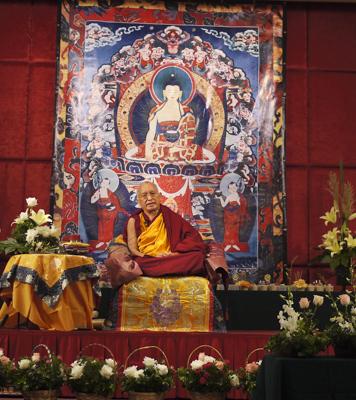Dear Friends,
Thank you so much for your kind interest in the Archive and for receiving our monthly eletter. As we write to you this month, the auspicious Buddha Multiplying Day of Saka Dawa approaches. Saka Dawa is one of the four great holy days of the Tibetan calendar and commemorates Shakyamuni Buddha’s birth, enlightenment and passing into parinirvana. Any actions done on Saka Dawa, either auspicious or harmful, are magnified in their power.
This year, Saka Dawa falls on Friday, June 9. Please read on for information about teachings and practices to engage in during this meritorious time and for the latest news about our current activities. Saka Dawa is also a very auspicious day to make a special offering of the prayers and practices for Rinpoche’s good health this year as has been advised by Khadro-la (Rangjung Neljorma Khadro Namsel Drönme).
NYUNG NÄS and SAKA DAWA
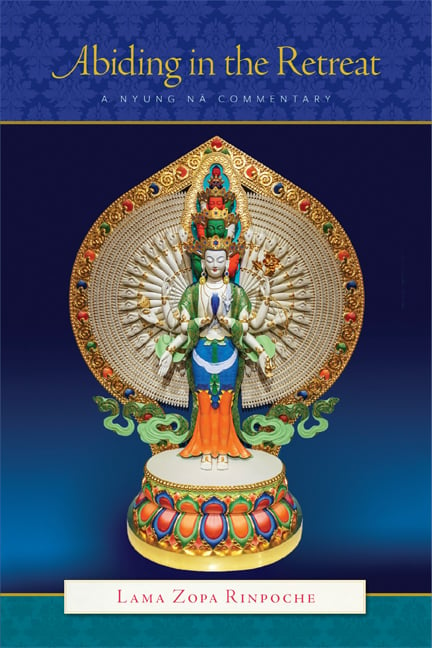 In July we will be publishing a new free book from Lama Zopa Rinpoche Abiding in the Retreat: A Nyung Nä Commentary, edited by Ailsa Cameron. The nyung nä retreat is a two-day intensive practice associated with Chenrezig that includes taking the eight Mahayana precepts for twenty-hour hours, with the addition of complete fasting and silence on the second day. The purifying power of nyung nä makes it an excellent practice to engage in over Saka Dawa. You can read an excerpt from the book in our November 2016 eletter and our March eletter from this year.
In July we will be publishing a new free book from Lama Zopa Rinpoche Abiding in the Retreat: A Nyung Nä Commentary, edited by Ailsa Cameron. The nyung nä retreat is a two-day intensive practice associated with Chenrezig that includes taking the eight Mahayana precepts for twenty-hour hours, with the addition of complete fasting and silence on the second day. The purifying power of nyung nä makes it an excellent practice to engage in over Saka Dawa. You can read an excerpt from the book in our November 2016 eletter and our March eletter from this year.
There are many more resources on the LYWA website to support you in your nyung nä practice:
• Read teachings on the nyung nä practice from Lama Zopa Rinpoche which were given during a nyung nä retreat at Lawudo Gompa, Nepal, in April 1978 and teachings given in Aptos, CA, in July 2000.
• Listen online and read along with the unedited transcripts from teachings on the nyung nä practice given at Shakyamuni Center, Taiwan in February 2007. The series includes an oral transmission of the nyung nä text and the long Chenrezig mantra.
• Read and search advice from Rinpoche on nyung nä practice on Rinpoche's Online Advice Book.
NEWS ABOUT OUR FREE BOOKS
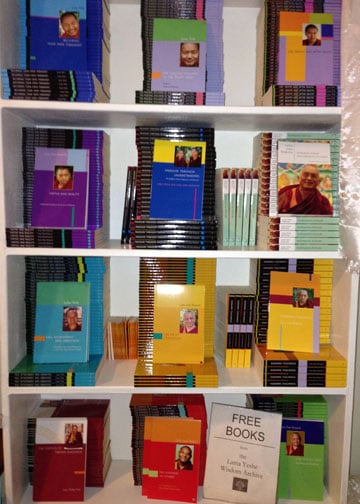 As we mentioned in last month's eletter, we have just reprinted four of our free titles, and soon Abiding in the Retreat will be adding to our catalogue of free book titles. We rejoice in being able to, with your support, make these free books available to everyone around the world.
As we mentioned in last month's eletter, we have just reprinted four of our free titles, and soon Abiding in the Retreat will be adding to our catalogue of free book titles. We rejoice in being able to, with your support, make these free books available to everyone around the world.
We are happy to announce that, in the wake of Wisdom Books, London, ceasing operations, we have arranged with Stichting Maitreya Instituut in the Netherlands to have LYWA books carried in their bookstore Boeddha Boeken! Now our customers in Europe and the UK will have an option to order our books with significantly lower postage costs. See the Boeddha Boeken website for details.
If you are lucky enough to live near an FPMT Center you know that they are especially happy to be able to offer our free books to students and visitors who come to their center. A center will often have our free books displayed like the ones pictured here. If your center doesn't have a display like this one and you'd like to find out how you can receive boxes of our free books, please contact us.
We are grateful to all of you who over the years have supported the Archive and made it possible for us to share these precious teachings with readers all over the world.
Watch: Lama Yeshe on The Transference of Consciousness at Death
It’s important to recognize that the primary resource of all happiness, misery, fear and confusion is the mind, not the physical body, but to fully understand our mind we need to investigate it. Understanding the nature of our mind is also the path to freedom from all fear.
— Lama Yeshe
Lama Yeshe gives this frank talk about the practice of po-wa, the transference of consciousness at death, in London in 1982. Lama notes the best death is a happy death and how po-wa practice can help us avoid a death that is disastrous, unhappy or confused. Lama goes on to describe the scientific nature of the practice and ends with a question and answer session that touches upon many of the concerns of the audience such as dying suddenly, the process of rebirth and the meaning of love. This talk has been published in the LYWA free book Life, Death and After Death.
What's New On Our Website
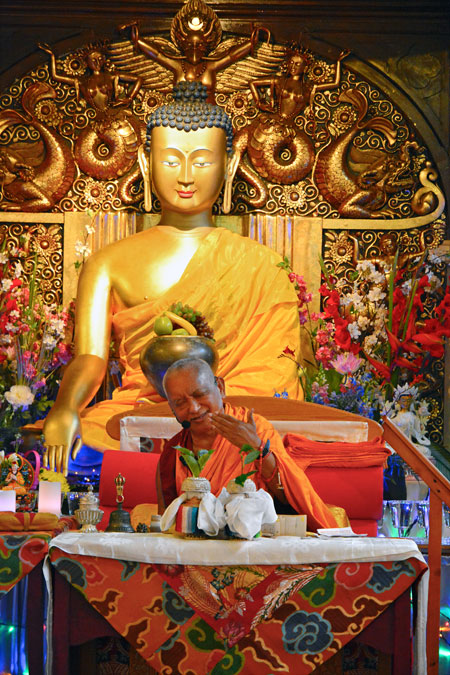 We have just posted a teaching from Lama Zopa Rinpoche on How to Live Life With the Good Heart. In this teaching, Rinpoche explains the importance of practicing the good heart and the role of parents in guiding their children. The teaching includes a prayer for children, as well as advice on Universal Education and the Liberation Card for the Dying Person. The teaching was given by Lama Zopa Rinpoche at Kadampa Center in North Carolina in May 2014 and was edited by Sandra Smith. An excerpt from this teaching is included as this month's eletter teaching below.
We have just posted a teaching from Lama Zopa Rinpoche on How to Live Life With the Good Heart. In this teaching, Rinpoche explains the importance of practicing the good heart and the role of parents in guiding their children. The teaching includes a prayer for children, as well as advice on Universal Education and the Liberation Card for the Dying Person. The teaching was given by Lama Zopa Rinpoche at Kadampa Center in North Carolina in May 2014 and was edited by Sandra Smith. An excerpt from this teaching is included as this month's eletter teaching below.
Additions to Lama Zopa Rinpoche's Online Advice Book this month include:
• The Absolute and Conventional Guru: Rinpoche offered this advice in response to a student’s questions about the ultimate and relative aspects of the guru.
• The Real I Cannot Be Found: Rinpoche advised a student how to meditate on emptiness correctly, in order to progress on the path to enlightenment.
• Legal and Financial Difficulties: A student requested practices to help with legal and financial difficulties and unemployment.
• Outer and Inner Obstacles to Dharma Practice: A student wrote that his partner was opposed to Dharma practice and that he experienced strange illnesses when making effort in his practice.
As always, you can see a list of the latest additions to the Online Advice book here.
This Month's Podcast: Lama Zopa Rinpoche on The Kindness of His Holiness the Dalai Lama
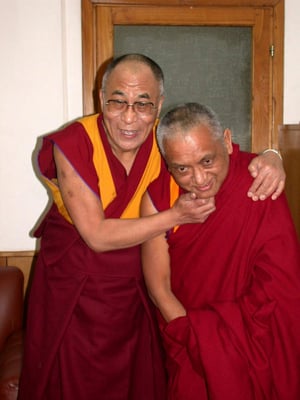 In our newest offering on the LYWA podcast, listen to Lama Zopa Rinpoche give a Dharma talk prior to a refuge ceremony at Amitabha Buddhist Centre, Singapore, in January 2009. In this talk Rinpoche focuses on the kindness of His Holiness the Dalai Lama in taking responsibility for preserving and spreading the complete Buddhadharma. Rinpoche also discusses other topics during this teaching including the kindness of all sentient beings, the benefits of making offerings, and how the Dharma center can help deepen our Dharma practice. Read along with the transcript on our website.
In our newest offering on the LYWA podcast, listen to Lama Zopa Rinpoche give a Dharma talk prior to a refuge ceremony at Amitabha Buddhist Centre, Singapore, in January 2009. In this talk Rinpoche focuses on the kindness of His Holiness the Dalai Lama in taking responsibility for preserving and spreading the complete Buddhadharma. Rinpoche also discusses other topics during this teaching including the kindness of all sentient beings, the benefits of making offerings, and how the Dharma center can help deepen our Dharma practice. Read along with the transcript on our website.
Remember that we have hundreds of hours of audio freely available to listen to or download from the Lama Yeshe Wisdom Archive website, and for most of them you can read along with an unedited transcript.
News from the Home Front
 Here in Lincoln the Spring rains are moving on and giving way to summer. You may remember that last summer Assistant Director Wendy Cook organized the relocation of 140 rabbits from a local meat farm and found them permanent loving homes. Pictured here is Wendy and one of her favorite buns, Kunsang (aka Papa Bear) visiting the local grocer, Russo's, to thank them for their weekly offering of fresh greens for all the rabbits we still have here.
Here in Lincoln the Spring rains are moving on and giving way to summer. You may remember that last summer Assistant Director Wendy Cook organized the relocation of 140 rabbits from a local meat farm and found them permanent loving homes. Pictured here is Wendy and one of her favorite buns, Kunsang (aka Papa Bear) visiting the local grocer, Russo's, to thank them for their weekly offering of fresh greens for all the rabbits we still have here.
While most of the rabbits have found their loving home, a few still remain in need. Visit Facebook to view more pictures and video of these precious beings and contact Wendy for more information or to adopt a rabbit.
Thank you all for your incredible support. We leave you with this teaching from Lama Zopa Rinpoche in 2014.
Much love,
Nick Ribush
Director
This Month's Teaching: Happiness comes from the mind
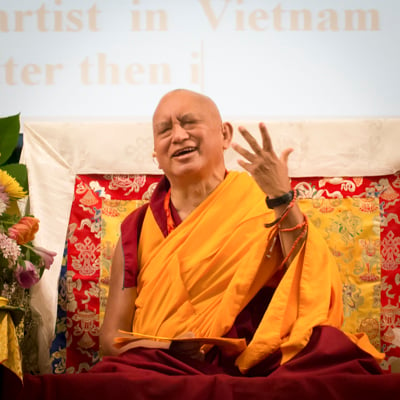 Karma is action; it’s called karma in Sanskrit, and in Tibetan, lä. The actions of delusion have a cause, and the root is ignorance, particularly the ignorance holding the hallucination, holding the appearance of the false I, and one hundred percent believing in the wrong I. That is the root of all the suffering. The root of suffering is not somebody else outside, not a god, not an ordinary person, not somebody else outside; it’s our own mind. That’s why we suffer.
Karma is action; it’s called karma in Sanskrit, and in Tibetan, lä. The actions of delusion have a cause, and the root is ignorance, particularly the ignorance holding the hallucination, holding the appearance of the false I, and one hundred percent believing in the wrong I. That is the root of all the suffering. The root of suffering is not somebody else outside, not a god, not an ordinary person, not somebody else outside; it’s our own mind. That’s why we suffer.
When we experience happiness, we have to see that happiness comes from the mind. Similarly, we have to stop the suffering, which comes from our mind. It doesn’t come from outside but from our mind. That is the whole point of meditation, Dharma practice, because we are looking for happiness. We are looking for happiness; we want to eliminate suffering and achieve happiness, which comes from within our mind—not from outside, but from within our mind.
Otherwise, looking outside at the world, there are global problems, country problems, society problems, family problems. I can say that we are always looking for happiness from outside; we are not looking for happiness from the mind. So our happiness does not increase that way and we can never find satisfaction. We always look for satisfaction but we can never find it.
That’s the fundamental suffering of the people in the world. For example, singers become very famous and then so much of their life is filled with worry and fear, much more than a beggar in the street. Much, much, much more. The worry and fear is a million, billion times worse than the beggar in the street. There is the competition, wow, wow, wow, then the worry and the fear that they will become lower and others will become higher. There’s so much worry and fear. They can never find satisfaction; even though they work for it they can never find satisfaction. That’s the biggest suffering.
There are so many people after them, even after they succeed as a famous singer or actor or whatever. What was I going to say? I’ve forgotten. Then they become suicidal. There are so many problems made by the mind, the concepts, because they do not know Dharma, they don’t practice Dharma, they don’t know about karma, they don’t know about the mind. The mind is made up of problems; there are many problems and they will blow up like an atomic bomb, they will blow up like a balloon. They will blow up, like that. [Rinpoche demonstrates]
Then, when the mind has not much space, there is suicide. There are many [suicides] happening in the world; I think every day there are many, many. Therefore, we need to stop the suffering from within our mind and this is the way to do it. Suffering comes from our mind; it doesn’t come from outside, it comes from our mind.
That’s why arya beings who have wisdom directly perceiving emptiness, those bodhisattvas, those arya beings are free. They don’t experience the suffering of rebirth, the suffering of old age, the suffering of death and the suffering of sickness, they don’t have pain. Even though they’re not enlightened beings, even though they haven’t achieved arhatship, those bodhisattva arya beings don’t experience this. Those beings who have achieved direct perception of emptiness have abandoned suffering. They have abandoned suffering, you understand, though they are not necessarily buddhas. Those who have a much higher [attainment] even before becoming an arhat, even before having achieved the total cessation of delusion, so arya beings. That [cessation of suffering] comes from this, by pacifying the delusions. So that comes from looking for happiness and attempting to find happiness from our own mind.
Besides buddhas, even arhats do not experience [suffering] because they have abandoned the cause of suffering—delusion and karma—therefore they do not experience that. They have achieved a blissful state of peace so they don’t experience, they don’t receive harm. Even if somebody gives harm, they don’t receive harm.
Especially with thought transformation, we can transform the suffering, the problems, into happiness; we can change. Instead of suffering, that suffering will transform into happiness, and it is dedicated to that; it is made into a positive. We can use the negative in a positive way, like that. In other words, we dedicate to achieve sang-gye, the total elimination of the obscurations and the complete development of realizations.
We use the problems for that, to achieve that. That means we use the problems to free the numberless sentient beings from the oceans of samsaric suffering and to achieve the peerless happiness, the state of omniscience. We use the problems for that, to achieve that. That’s unbelievable, most unbelievable, unbelievable, unbelievable, unbelievable. The reason we can do that is because of seeking happiness from our mind, so we can do that. Otherwise, we can’t do that; we have no choice.
Now there are children here, I think, and that’s why we have the meditation center. Before, speaking about children, that’s why we have the meditation center, the Dharma center—for learning, for reflecting, for meditation practice. That’s why it’s so important.
As I mentioned at the beginning, there are the sufferings, the problems in the world. Now the problems and disasters in the world are happening more and more. It’s just amazing, you can never tell, particularly nowadays, like that.
We see more suffering, therefore Dharma study and meditation becomes more important; practicing Dharma becomes more important. We have to know that. That’s how we can achieve happiness ourselves, how we can cause happiness and bring happiness to the world—through our subdued mind, through our peaceful mind, our good heart.
The teaching was given by Lama Zopa Rinpoche at Kadampa Center in North Carolina in May 2014 and was edited by Sandra Smith. You can read the rest of this teaching on our website. Additional excerpts will be posted next month.
























